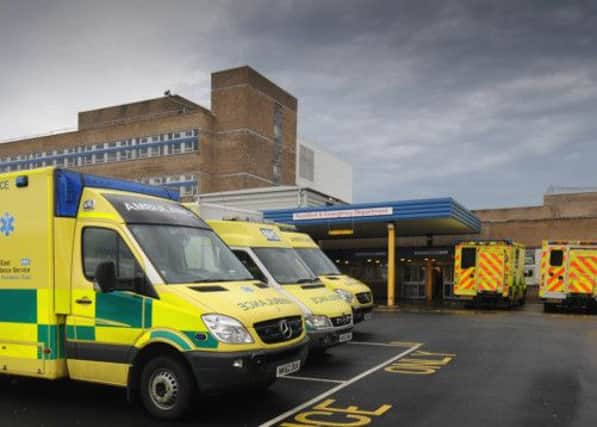One in 10 casualties at A&E unit drink related


Doctors at York Hospital say the results for the first time expose the scale of problems linked to alcohol, with as many as one in 10 of all patients arriving in casualty due to excessive drinking, rising to one in five overnight.
They are warning alcohol is imposing a “disproportionate burden” on both A&E and ambulance services when pressures on staffing and meeting NHS targets are at an all-time high.
Advertisement
Hide AdAdvertisement
Hide AdEmergency consultant Gill Kelly, who carried out the study, said wider national action was needed and called for a minimum price for alcohol.
Prime Minister David Cameron had thrown his weight behind the measure but the coalition has controversially dropped the plan, prompting heavy criticism from doctors and campaigners.
The impact of alcohol on A&E services is difficult to assess since in most cases the role of drink is not recorded in official figures.
But doctors in York looked at every patient record over four randomly selected weeks in 2011 to find out if alcohol was a factor in treatment. They discovered evidence of alcohol behind 553 attendances – a 12-fold increase on 46 patients officially listed as having problems related to drink – out of a total of 5,700 patients treated overall.
They found:
Advertisement
Hide AdAdvertisement
Hide AdOne in 10 attendances were alcohol related, rising to one in five from 9pm-9am;
Some 18 per cent of ambulance journeys were due to alcohol;
Nearly half of all patients with mental health problems had been drinking;
Of those who refused treatment, 55 per cent had been drinking.
Advertisement
Hide AdAdvertisement
Hide AdSignificantly, they found 10.3 per cent of patients who had been drinking spent more than four hours in casualty, compared with 5.9 per cent of those who were sober, suggesting staff had to spend more time with those who were drunk.
Staff estimated the total extra cost to the hospital, which is not accounted for in NHS payments, amounts to more than £550,000 in a year.
Dr Kelly said the impact on ambulance services was particularly worrying.
“That’s an ambulance that could be used for people suffering strokes or heart attacks but they’re not because they are dealing with people who have drunk too much,” she said.
Advertisement
Hide AdAdvertisement
Hide Ad“What we also find is that if somebody is in the department with a problem linked to alcohol, we spend a disproportionate amount of time trying to help them help themselves. We often have to ensure they’re safe and that’s time and effort that we can’t spend with somebody else.”
She said banning cut-price promotions at supermarkets and off-licences would make alcohol less affordable and in particular stop people “pre-loading” before going out at night.
“There is evidence that minimum unit pricing works – it doesn’t affect the night-time economy – it only affects places where alcohol is sold in off-licences and supermarkets,” she said. “If the price went up there would be less pre-loading.”
She added: “We’re not saying you cannot enjoy a sensible drink. However it’s clearly being taken to an extent which is very very detrimental to people’s health.”
Advertisement
Hide AdAdvertisement
Hide AdA public consultation is underway in York for a late-night levy on bars and clubs selling alcohol after midnight.
Councillor James Alexander, the leader of York Council said the figures were further evidence of the strain on public services posed by alcohol.
Action was being taken in the city to tackle anti-social drinking but he also favoured reducing the duty on lower-strength drink in pubs and increasing that on alcohol in supermarkets to combat “pre-loading”.
“We’re not against people wanting to enjoy themselves but we think there are additional measures which could be put in place like the late-night levy,” he said.
Advertisement
Hide AdAdvertisement
Hide AdDavid Williams, deputy director of operations at Yorkshire Ambulance Service, said higher numbers of calls at weekends and bank holidays linked to drinking put the service under increased strain.
“We are working closely with our healthcare partners, local authorities and the police to address the difficulties we experience in dealing with alcohol-related incidents,” he said.
“One initiative that is up and running in busy town and city centres is a police and paramedic team on duty in a rapid response vehicle. People who are injured are seen quicker, the police have a paramedic immediately on scene, the number of unnecessary trips to the hospital emergency department is reduced and our ambulances are left to deal with more serious emergencies.”
A Home Office spokeswoman said the government wa taking a “wide range of action” to tackle alcohol-related crime and disorder which costs £11 billion a year in England and Wales.
Advertisement
Hide AdAdvertisement
Hide Ad“We have given local areas the power to restrict the sale of alcohol in the early hours and ensure those who profit from a late night licence help pay towards the costs of policing,” she said.
“We continue to work with industry to increase its efforts to promote safer drinking and we are supporting innovative action at a local level, encouraging police to share good practice based on what works in their area.”